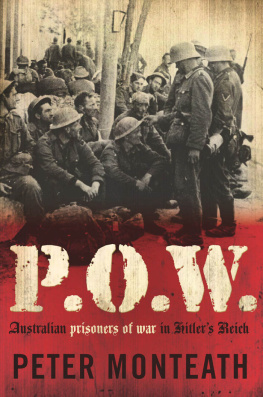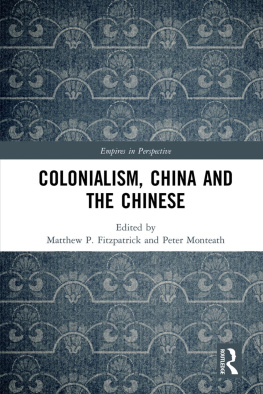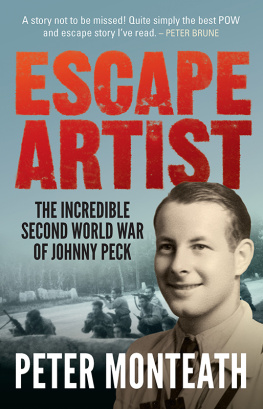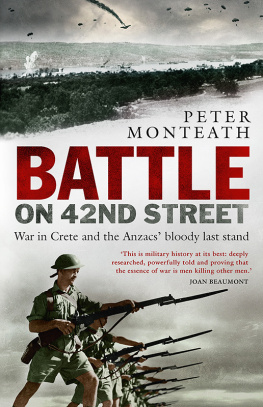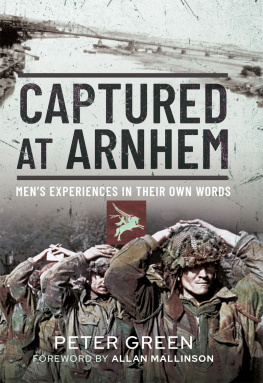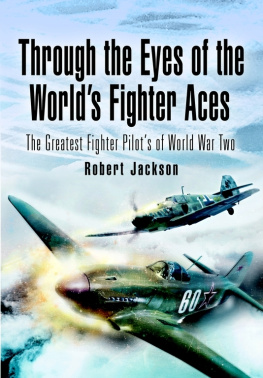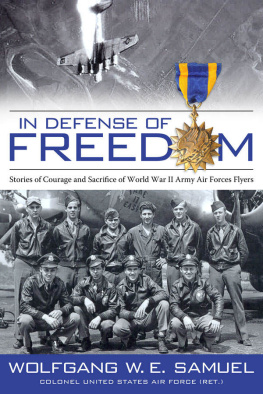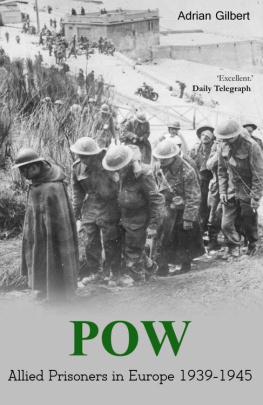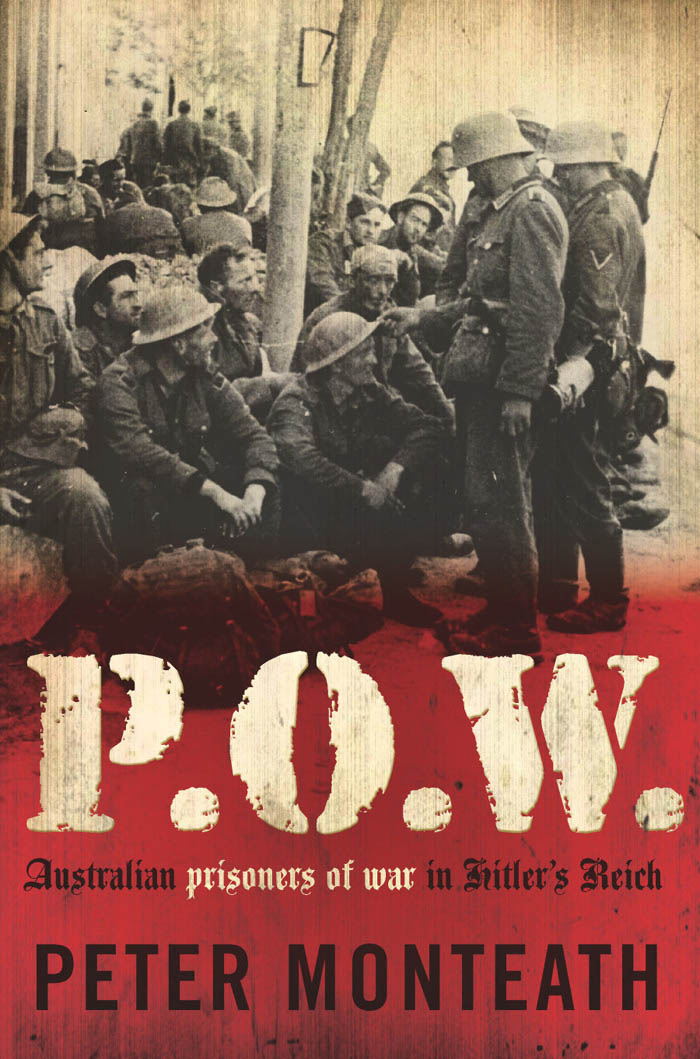Peter Monteath was born in Brisbane and educated in Queensland and in Germany. He has taught previously at The University of Queensland, Griffith University, Deakin University, The University of Western Australia and The University of Adelaide. He has also been Adjunct Professor at The University of MissouriSt. Louis and the Technical University of Berlin, where he was an Alexander von Humboldt Fellow. Currently at Flinders University, he teaches modern European history and is Director of Research in the Faculty of Social and Behavioural Sciences.

Australian prisoners of war in Hitlers Reich
PETER MONTEATH

First published 2011 in Macmillan by Pan Macmillan Australia Pty Limited
1 Market Street, Sydney
Copyright Peter Monteath 2011
The moral right of the author has been asserted.
All rights reserved. No part of this book may be reproduced or transmitted by any person or entity (including Google, Amazon or similar organisations), in any form or by any means, electronic or mechanical, including photocopying, recording, scanning or by any information storage and retrieval system, without prior permission in writing from the publisher.
National Library of Australia
Cataloguing-in-Publication data:
Monteath, Peter.
P.O.W. : Australian prisoners of war in Hitlers Reich / Peter Monteath.
9781742610085 (pbk.)
World War, 19391945 Prisoners and prisons, German Personal narratives. World War, 19391945 Personal narratives, Australian.
940.5472
The author and the publisher gratefully acknowledge permission granted to reproduce material from the Australians at War Film Archive (AAWFA).
Typeset in Sabon 11.5/15pt by Midland Typesetters, Australia
Maps by Laurie Whiddon, Map Illustrations
Printed in Australia by McPhersons Printing Group
Papers used by Pan Macmillan Australia Pty Ltd are natural, recyclable products made from wood grown in sustainable forests. The manufacturing processes conform to the environmental regulations of the country of origin.
The author and the publisher have made every effort to contact copyright holders for material used in this book. Any person or organisation that may have been overlooked should contact the publisher.
These electronic editions published in 2011 by Pan Macmillan Australia Pty Ltd
1 Market Street, Sydney 2000
The moral right of the author has been asserted.
All rights reserved. This publication (or any part of it) may not be reproduced or transmitted, copied, stored, distributed or otherwise made available by any person or entity (including Google, Amazon or similar organisations), in any form (electronic, digital, optical, mechanical) or by any means (photocopying, recording, scanning or otherwise) without prior written permission from the publisher.
P.O.W.: Australian prisoners of war in Hitlers Reich
Peter Monteath
Adobe eReader format | 978-1-74262-742-7 |
EPub format | 978-1-74262-744-1 |
Online format | 978-1-74262-741-0 |
Macmillan Digital Australia
www.macmillandigital.com.au
Visit www.panmacmillan.com.au to read more about all our books and to buy both print and ebooks online. You will also find features, author interviews and news of any author events.
In memory of Keith Hooper and those like him
Contents
List of Maps





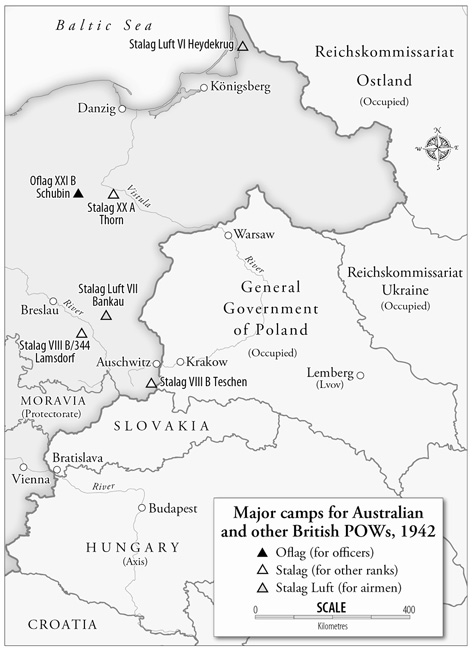
INTRODUCTION
The Plight of the POW
Prisoner of War! That is the least unfortunate kind of prisoner to be, but is nevertheless a melancholy state. You are in the power of your enemy. You owe your life to his humanity, and your daily bread to his compassion. You must obey his orders, go where he tells you, stay where you are bid, await his pleasure, possess your soul in patience. Meanwhile the war is going on, great events are in progress, fine opportunities for action and adventure are slipping away. Also the days are very long. Hours crawl like paralytic centipedes. Nothing amuses you. Reading is difficult; writing impossible. Life is one long boredom from dawn till slumber.
Winston Churchill
A stint in a POW camp in Pretoria during the Boer War taught the young war correspondent Winston Churchill the misery of military captivity. Indeed, the lot of the prisoner of war had always been a wretched one, as he well knew. Plucked from the field of battle, the POW could expect at the very best a stint of unrelieved boredom, accompanied by the ignominy of prolonged absence from his assigned duty on the field of battle. Moreover, posterity merely underlines that ignominy history books typically consign POWs to their footnotes. At the other end of his range of hopes or expectations, an abrupt and violent death might await the POW in the very near future, or perhaps a life of drudging slavery, far removed from the familial warmth and comforts of his homeland.
In the ancient world those bleaker outcomes were commonly confronted. The Old Testaments book of Samuel speaks eloquently of the uncompromising measures meted out to the vanquished: Now go and smite Amalak, and utterly destroy all that they have, and spare them not; but slay both man and woman, infant and suckling, ox and sheep, camel and ass. Wittingly or otherwise, armies in Biblical times appeared to have followed these injunctions with some relish.
Yet clemency too was not unknown in the ancient world. At the end of hostilities Egyptian soldiers would check the battlefield for bodies, both living and dead. The dead were counted, the dying executed, but the living, including those who had surrendered, were taken captive and presented to the pharaoh, to whom they automatically belonged, and who held the power of life and death over them. In most cases, it was the power of life which held sway, so that the prisoners were returned as slaves to their captors as a reward, given their freedom after swearing loyalty to the pharaoh, or returned to Egypt as labourers or hostages. Some might even enter service in the Egyptian army. For an unfortunate minority, typically high officials or royalty, ceremonial execution awaited, after which their bodies were paraded through conquered territories and through Egypt as a salutary lesson to all who viewed them.
To the stark alternatives of death, enslavement and enlistment in the foes army, Roman history added a new option. In the Battle of Cannae, Carthaginian forces managed to take some 10,000 Roman They were words that Hitler and Stalin were to echo many centuries later. In the end, pity re-emerged, and when Hannibal was finally defeated at Zama, Scipio Africanus brought home all the Roman POWs he could still find.

